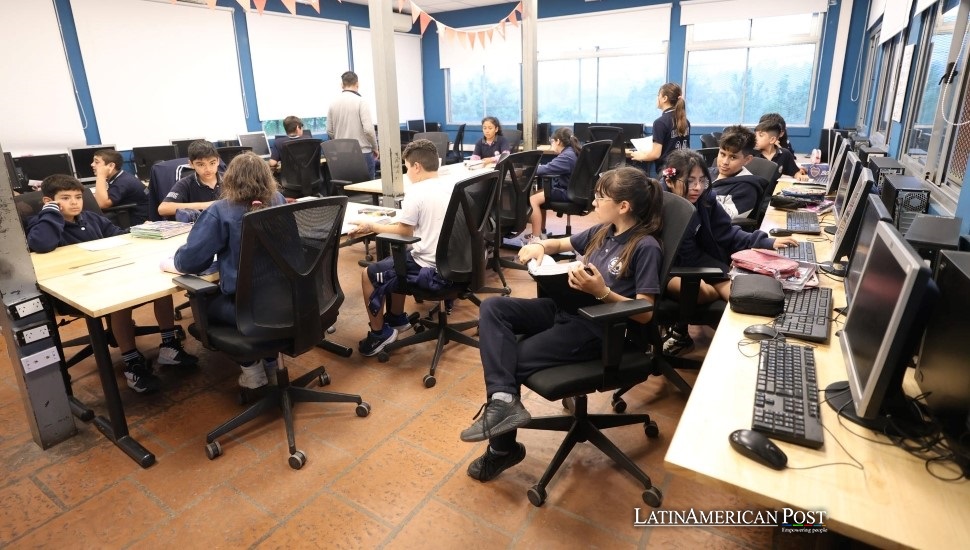Economic Impact of Argentina’s Award-Winning Socially Inclusive School

Colegio María de Guadalupe in Buenos Aires has transformed its local community and won global acclaim for its community collaboration. As an education model of social inclusion, the school’s success demonstrates how targeted initiatives can drive long-term economic growth.
Economic Impact of an Inclusive Education Model
In Las Tunas, a working-class neighborhood in Buenos Aires, Colegio María de Guadalupe has emerged as a transformative force in education and the local economy. Recently awarded as the “World’s Best School” in Community Collaboration, María de Guadalupe has become an economic and social advancement model through its commitment to social inclusion and community empowerment.
Nearly 700 students walk or bike to the school through Las Tunas’ dirt roads each morning. Once inside, they find a nurturing environment that rivals some of the best private institutions in Buenos Aires, even though many students live in precarious housing and face overcrowding. The school’s approach centers on preparing students to excel academically and vocationally, bridging the gap between education and economic prosperity. María de Guadalupe is driving meaningful economic change in its community by equipping students with skills that lead directly to employment.
A unique blend of public and private funding makes the school’s low-cost, high-quality education possible. Support from the provincial government, local businesses, and civil society organizations ensures that María de Guadalupe’s students receive a world-class education without the high fees typical of private schools. This collaborative funding model benefits students and has a ripple effect on the local economy, empowering entire families and creating a pathway to economic mobility.
Vocational Programs and Workforce Development
The school’s impact goes beyond academic achievements. It also serves as a bridge to the workforce for students in a country where only 20% of low-income youth attend university. María de Guadalupe’s vocational training and career placement programs prepare students for specific fields, helping them secure stable, well-paying jobs that lift entire households out of poverty.
As director of institutional development, Malu Diez explains, “Our goal is to provide students with the tools to create their own futures.” Through partnerships with local companies and universities, students are trained in academic subjects and practical, employable skills. The school prioritizes students from vulnerable backgrounds in its admissions process, ensuring that those who need it most have access to these opportunities.
The program’s results speak for themselves: 43% of María de Guadalupe graduates are employed, while 44% continue their studies, and only 13% neither study nor work. These statistics highlight the school’s success in preparing students for life beyond the classroom, ultimately contributing to the community’s economy by creating a skilled, educated workforce.
This workforce development approach fosters economic growth in Las Tunas. With more graduates entering the labor market, the community has seen increased spending power, supporting local businesses and services. As families’ economic circumstances improve, they can invest more in their homes, businesses, and regional infrastructure, further strengthening the community.
A Public-Private Partnership Success Story
María de Guadalupe’s innovative public-private partnership model is crucial to its economic impact. Though the school operates as a private institution, it relies on substantial subsidies from the government and donations from businesses and nonprofits. This funding model allows the school to offer high-quality education at a minimal cost to families, making it accessible to low-income students who otherwise may not be able to afford it.
Collaboration between the public and private sectors has been essential to the school’s ability to drive economic change. María de Guadalupe has created a network of professional partnerships that involves local businesses and provides students with job training and career opportunities. This network extends to the Fundación Grupo Educativo María de Guadalupe, the nonprofit organization that founded the school and recently opened a new campus in a nearby underserved community.
Luis Arocha, the school’s executive director, emphasizes the importance of these partnerships, stating, “When students succeed, their families and communities benefit as well. We’re elevating the cultural and economic aspirations of the neighborhood, setting off a ripple effect that strengthens the entire local economy.”
This funding model has the potential to be replicated in other communities across Argentina and Latin America. As different schools adopt similar approaches, public-private partnerships could become a driving force behind educational reform and economic development throughout the region.
National and Regional Implications
María de Guadalupe’s success is a source of pride for Argentina and a model that could be adopted across Latin America. In a region marked by significant economic inequality, educational institutions focusing on social inclusion and workforce readiness are essential for sustainable development. The school’s impact has already extended beyond Buenos Aires, with plans to collaborate with institutions in provinces like Mendoza and Catamarca to bring similar models to other underserved communities.
Arocha believes the school’s recognition on a global stage could inspire other educational institutions to prioritize social inclusion and economic empowerment. “If a country’s education system improves, society, democracy, and prosperity will also improve,” he says. This mindset aligns with broader economic goals across Latin America, where countries such as Brazil, Colombia, and Mexico seek ways to reduce poverty through workforce development and educational reform.
For María de Guadalupe, the World’s Best School award is more than a celebration—it is an invitation to share its model with others. By fostering economic mobility through education, schools like María de Guadalupe play a vital role in closing the income gap, ultimately building more robust, resilient economies. The school’s focus on preparing students for high-demand fields benefits individual graduates. It contributes to regional economic growth by creating a workforce that can meet the demands of modern economies.
Also read: Argentina’s Economic Struggles Worsen as Poverty Rate Surges
As Latin American economies continue to grow and modernize, the María de Guadalupe model offers a roadmap for how targeted investments in education can yield long-term economic benefits. Other regional schools can replicate this success by prioritizing social inclusion and leveraging public-private partnerships, fostering a new generation of skilled workers ready to contribute to their countries’ economies.





